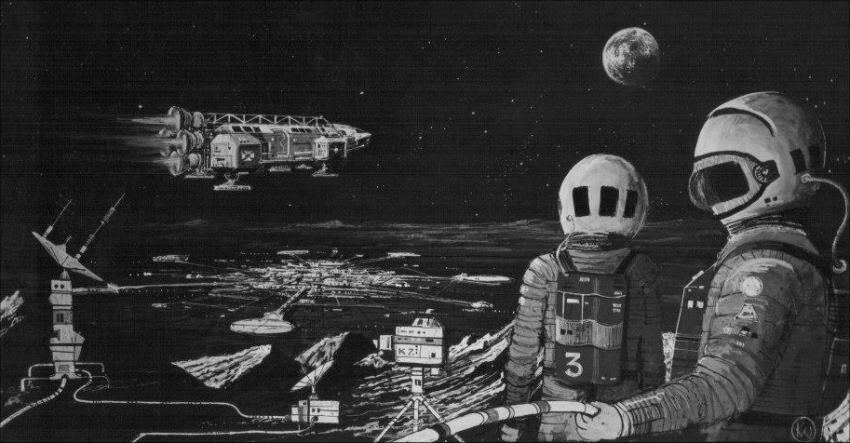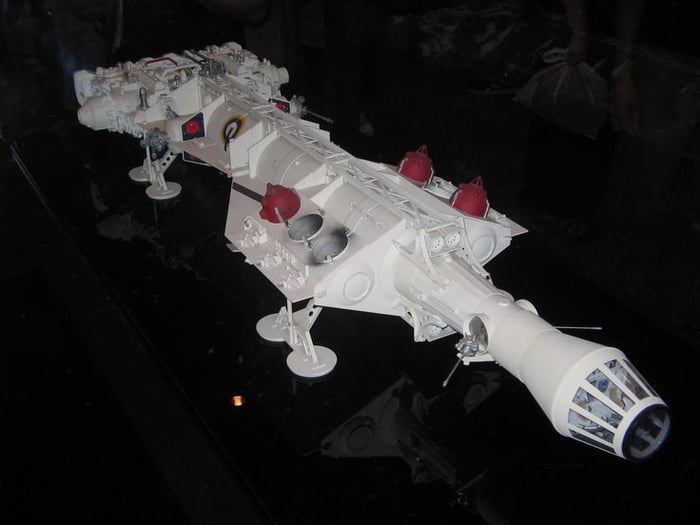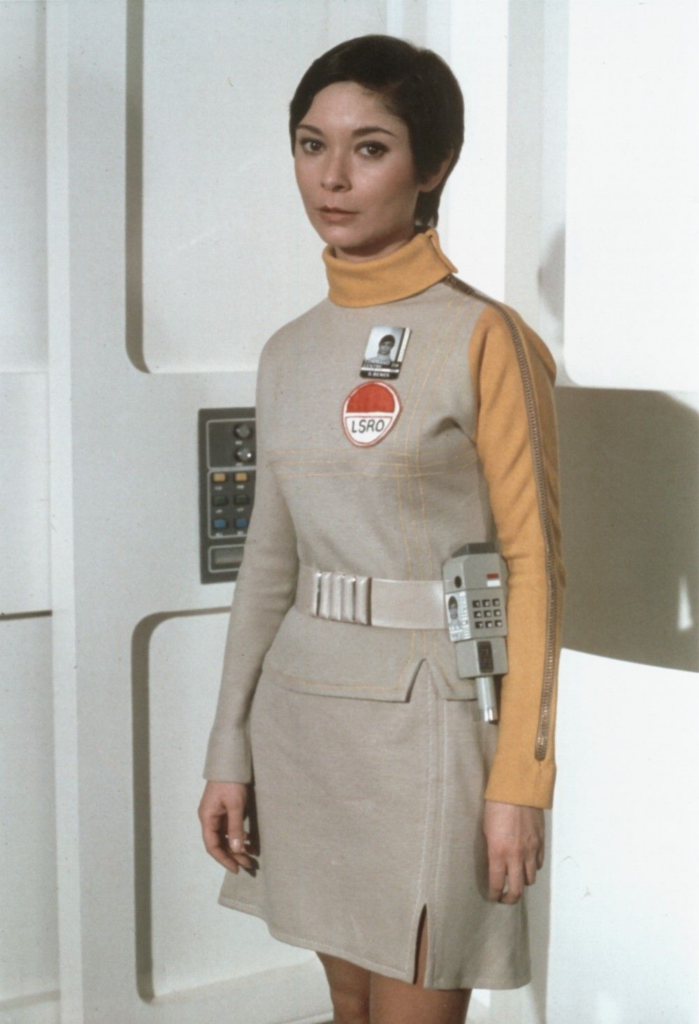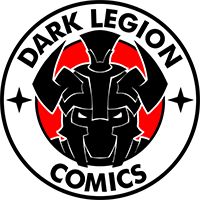The 21st Century of Gerry Anderson – Space 1999 (part 1)

When I first saw the Millennium Falcon as a little kid in 1977, I thought it was the coolest thing in all existence. There was nothing about it that I didn’t love. The WWII AA guns were cool, the B-29 bomber bridge was cool, even the boarding ramp was cool. I had literal dreams about the Falcon. I was in love. That isn’t to say that it didn’t raise a question in my young little head. If this was a freighter, where did you put the *freight?
The truth is the Millennium Falcon was badly designed to transport any kind of legal cargo. And if the YT class was designed from the ground up to be a rumrunner, then the Empire would just blast them out of the sky whenever they ran across one.
I eventually found out that the original design was this.

This design does look a lot more like a tramp freighter. While George Lucas liked it, he ultimately felt compelled to shoot it down because it looked too much like this.

There was a time that Space 1999 was the biggest thing in TV science fiction. There were nerd fights over whether or not it was akshullay better than Star Trek. They were pointless battles to be sure, but they happened. Which means people genuinely cared about it. At one time there was a passionate fanbase for the last of 21st Century Studio’s live action science fiction shows.
Gerry Anderson is frequently described by those who loved him as the least sentimental man they ever knew. When a project was over, he lit it with a match, turned, and walked away without ever looking back at the smoldering remains. Anderson had created something uniquely wonderful with Supermarionation. For better than a decade Gerry Anderson had developed and built up a team of experts who delivered something that even today is just a little magical. But when The Secret Service was canceled by Lew Grade. Gerry Anderson shut it all down, fired everyone, then had the models and puppets smashed with sledgehammers, throwing Supermarionation away as garbage.
When UFO didn’t get an American network buy, it died for Anderson. On to the next live-action and non-child-friendly project. A completely forgettable early seventies British actioner called The Protectors. I’ll give credit where it’s due, it was a lot better than it should have been. It wasn’t a spy show, that craze was over, but you couldn’t call it a police procedural or a private eye drama either. Basically, Anderson didn’t really commit himself to it being anything other than a generic team of action men (and one woman) for hire. Britain’s entry into the Common Market meant that they could now shoot all over Europe instead of just Birmingham. The use of 16mm film kept the cost down, hiring Robert Vaughn got the show a syndication deal in America, and the opening theme could not have been more Swinging London.
While the Protectors was in production, Sylvia got a shocking call from Lew Grade. UFO had emerged from its crash site.
CBS’s channel in New York City was running it right before the number one rated, All In The Family and that show’s halo effect had shot the dead series’ ratings through the roof. CBS wanted to buy a second season.
Out of the blue, the brass ring was suddenly within reach of Gerry and Sylvia Anderson. An American TV network deal at along last.
Problem.
They couldn’t deliver. UFO’s sets had been destroyed, the props sold or scrapped, and the actors had moved on to other projects.
No getting around it. If Gerry was going to get his score bigger than life, then he was just going to have to create a new show. And UFO 2 was born.
Since this was a Gerry Anderson show the very first thing that would be needed was an acronym. This time it was W.A.N.D.E.R. World Association of Nations Defending Earth Rights. He must have torn his hair out trying to come up with a better “R” word than Rights.
The most popular episodes of UFO had been based in space, so the new series was going to be set on the moon, at a much bigger moon base. Moon City’s fortifications were so overwhelming that no UFO was getting passed it now. Consequently, the Alien’s plans were now based around the destruction of Moon City. Destroy that and the Earth would be theirs for the taking… I guess.
Preproduction was going like clockwork. Ed Bishop was delighted to be back on board as Commander Straker. And the pilot episode was ready to be shot. It was about Earth building an unmanned deep-space probe that would be sent to the Alien’s homeworld. The Aliens weren’t cool about this and diddled around with the Moon’s gravity, sending the space probe hurtling into the unknown.
And then the Andersons got the call from New York. CBS had moved UFO to another timeslot and the ratings had crashed. CBS was out, they pulled the plug on the project.
By now, ITC had sunk too much money into UFO 2 and Gerry Anderson invested too much of himself. They went into emergency salvage mode.
ITC America, whose requirements would eventually destroy Space 1999 sprang into action making brainless demands. The personal cost of commanding the defense of Earth had been enormous to Ed Straker and had been a hit with the show’s fans. But ITC America’s Abe Mandell hated it and commanded that Straker be discarded for a new character.
Sorry, Ed.
Martin Landau was a respected actor with an extensive resume. He had started off in TV westerns of the 1950s and 1960s. However, his looks tended to typecast him in villain roles. He didn’t mind at first, villains were fun and were always in demand. He was just getting into film work when he made a big mistake. He accepted a regular role on Mission Impossible. He was too good at it, and it instantly typecast him as a spy. Worse still, the spy craze ended as suddenly as it started. Back to villain work but now it was starting to feel like a treadmill for him.
Still, he hesitated when ITC America offered him a job as The Commander in a new science fiction series. It was going to be shot in Britain and he didn’t want to be separated from his wife for half a year, every year. That drawback was passed along to Gerry Anderson. As luck would have it, Anderson suddenly discovered a pressing need for a doctor character, a female doctor character who would be a co-lead, and would Landeau’s wife be interested?
Now Anderson needed somebody else to be the science wonk. Doctor Victor Bergman was invented and the part went to Barry Morse. Morse was born in London at the end of WWI and worked in British theater and film. Then he went to Canada and from there drifted south to Hollywood. His best-known role in the US was as the relentless Marshall Phillip Gerard in The Fugitive. Like, Landeau he was a respected and reasonably well-known character actor. And Morse still had his British Actor’s Equity card which solved a major headache.
There were a few other supporting characters. Paul Morrow was Commander Koenig’s absolutely loyal second in command.

He was also supposed to be the show’s male sex symbol. However, Carter, the blond Aussie pilot snaked that job away from him.

The female sex symbol was supposed to be the Italian, Sandra.

Plus, a few others here and there.
The idea of the Moon being blown out of orbit was fundamentally silly. And the sad truth was everyone including Gerry and Sylvia Anderson knew it was silly. The problem was, again, Abe Mandell who was now insisting on there being no scenes on Earth whatsoever. Because Mandell was certain, (okay with reason), that it would just be scenes in the UK. And Mandell hated all things British. Most especially British science fiction.
Gerry Anderson offered to blow up the Earth if that would help. Mandell said, ‘no, too dark.’ They were far too committed to a lunar setting to change any of that, so blowing the Moon out of orbit was a compromise that no one was happy with but that everyone could agree to.
Anderson’s shows had usually been setting-driven before and that was what science fiction mostly was back then. Every story began with “What If…” And Space 1999 certainly looks like that when you first glance at it. But once you get to know it, you start to see a lot more things that are subtly character-driven, the heart of the stories are, “Tell Me About A Guy Who…”
The romantic relationships were all rather low-key. Sandra and Paul were mutually interested so were the Doctor and the Commander. However, there was an air of, we just can’t pursue a relationship, not now, not in this situation. In the episode Another Time, Another Place. The direction these relationships would go, if only circumstances would allow is explored. In the episode, Black Sun, the inhabitants of Alpha are faced with the prospect of their own mortality when the Moon falls into the gravitational well of a black hole. This was the most character-driven story in the series. Faced with their inescapable death, they all settle into a state of quiet fortitude as they await the inevitable with grace and even a bit of optimism. Doctor Bergman became my favorite character when he said, he was hoping that whatever was on the other side was going to be interesting. You are left with a quiet affection for all the characters because they feel like good people.
Sadly, these things only applied to the first season.
End of Part 1
Discuss on Social Galactic
*Please, please, don’t humiliate yourself by answering that.

